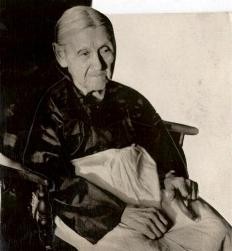Biography of Martha Irby
![]()
Spokesman-Review April 25, 1926
WOMAN RECALLS PIONEER DAYS
Husband's Skill With Bull Whip Saves Wagon Train From Indians.
CAME WEST IN 1852
In Spite of Wildcats and Redskins Mrs. Irby Has Many Descendants.
Life was rough to Mrs. Martha Irby, E 3508 Pacific, but at 96 she is
able to walk with the aid of canes, to read and sew. Her hearing
is not good, but her mind is bright, and she remembers with unusual clearness
for one of her age the California gold rush days when she came west with
her husband by ox team. That was in 1852.
She had with her a baby of two months, one of two years, a step daughter
and a step son of 10 years, but now she counts her descendants to the fourth
generation. She had nine children, of whom four are living; and there
are 21 grandchildren, and eight great-grandchildren and three great-great-grandchildren.
Lives With Daughter.
She lives with her daughter, Mrs. Laura Stout. The other surviving
children are Mrs. KATHERINE GOODWIN of Yakima, who was the baby Mrs. Irby
brought across the plains; ISOM IRBY of Wenatchee, and J. D. IRBY of Northport.
The town of Irby between Odessa and Wilson Creek on the Great Northern
was names for Isom Irby.
The Irbys made the journey from Springfield, MO., to Vancouver, in
Oregon territory, in 1852. They had been told it was no use to take
many household goods and found from experience such was true. For
they lost many of the few articles they did take. Some things went
overboard when they crossed rivers, others were broken.
If it had not been for Mr. Irby's courage, resourcefulness, and powerful
physique, they would have even lost their oxen. One of their experiences
was as encounter with a horde of Indians hidden in a grove which the road
they were traveling passed through. A redskin seized the leading
ox of the Irby wagon by the horns, and thus held up the whole wagon train,
which Irby was leading. The Indian started to unhitch the steer.
Mrs. Irby was frightened, as were the other women, at the prospect
of a scalping party.
Lashes Indians Foe.
Mr. Irby was a good hand with the bull whip. He gave the Indian
a sharp cut with the lash; and when the brave held on to the steer, gave
him a harder "whop" as Mrs. Irby said. He let go and ran for
shelter.
The whole party reproached Mr. Irby for arousing the Indians, but the
savages didn't molest the travelers further, probably because there were
regular troops in forts not far away.
the old lady recalls passing through the cholera area along River Platte.
There were graves everywhere, she said.
Most of the company went to California, but the Irbys settled four
miles from Vancouver. That was just before Christmas, and the weather
was bitter cold. Mr. Irby built a log cabin but he didn't have time
or material to chink it, or put in a floor, door, or windows. He
had to go to Vancouver to work so he could buy provisions for the family,
for like the settlers, they were penniless when they arrived.
Improved Pioneer Home.
Mrs. Irby and the two children, who were old enough to help, improved
the cabin with a bedstead made of forks driven into the ground and saplings
laid across, using fir boughs for springs and mattresses. Mrs. Irby
also had a couple of little chairs she picked up on the plains. A
blanket took the place of the door; while instead of a fireplace there
was a space in the center of the cabin floor for the fire. The smoke
was supposed to go up through the gable, but not all of it did. The
outside got the house served as the refrigerator for the meat from the
animals the oldest boy killed. A cougar spoiled this arrangement
one night by making off with a large piece of venison.
Mr. Irby's habit was to come home from Vancouver every Saturday evening,
bringing supplies for the family for the week. He would return to
the settlement Sunday evening. Mrs. Irby recalls that a heavy snowstorm
prevented his visit for two weeks. Though they conserved their food
carefully, the supplies dwindled until they had nothing but a piece of
bread.
Waiting is Rewarded.
The oldest girl asked for her share right away, saying she could wait
no longer. It was about sundown that their anxious eyes, watching
the path Mr. Irby always took, saw something plunging through the three
feet of snow. It was Mr. Irby with a sled load of provisions.
After that he brought the supplies to a house about two miles from
the cabin and Mrs. Irby and the children packed them home from there.
Next summer luxury came to the cabin in the form of a floor, a fireplace,
and a door.
There were MO Lamps. The only light came from the fire and when
they wanted a light outdoors they improvised a lamp with a tin full of
oil and a rag for a wick; or else used pitchy fir for torches.
With a little grubbing hoe Mrs. Irby dug little holes in a small natural
clearing and her step=son dropped in potatoes. BY these primitive
methods she raised enough spuds to last all summer and the next winter.
Grouse Were Plentiful.
For meat, beside occasional deer, they had plenty of grouse.
When Mr. Irby left the cabin Sundays for Vancouver he would shoot the birds
and the family would follow him and gather them.
One day the dogs made a great noise and the family thought the Indians
were attacking. The boy was to scared he couldn't load the gun.
No redskins appeared.
Mrs. Irby recalls that a cougar treed a tenderfoot settler and then
was rescued. He protected himself from the cat's repeated attacks
by means of a club. The tree was worn smooth from the animal's claws.
This settler went back to Illinois soon after..
Mr. Irby sold his donation about the time of the Civil War for a good
price, but he was not paid until after the war and then in paper money
worth 40 cents on the dollar.
While they were still living near Vancouver, Indians turned canoes
loose on the Columbia and threw a scare into the settlers, who thought
a war party was coming down on them. They rushed to their picket
forts for protection and sent parties to Vancouver for ammunition.
The scare soon blew over.
The Freezing over of the Columbia river was one of the incidents Mrs.
Irby remembers. That was so long ago. She said teams crossed
the river above Vancouver with loads of hay. The ice didn't break
up until April.
Columbia Froze Over.
In 1868 the Irbys moved from Clarks county to Yakima county and stayed
there until 1872. In 1872 they homesteaded in Spangle, then called
Pine Grove. They raised cattle in the Crab Creek country until they
were chased out by the Indians during Chief Joseph's War in 1877.
They left everything and started for Walla Walla. At Washtucna they
were told the rumored Indian uprising was only a drunken row, so the women
kept on to Walla Walla, and Isom Irby and a man named Tom Walters turned
back. They found the house wrecked and every utensil and tool ruined.
The milk pans were shot full of holes and the pitchfork handles sawed in
two. Their summerís provisions were taken.
Later they all moved back; but in the spring of 1878 the Indians became
boisterous again. At the point of drawn books, they drove Mrs. Irby
and her daughter away.
Mr. Irby died at Spangle in 1906 and in 1913 Mrs. Irby went to Rockford
to live with her daughter, Mrs. LAURA STOUT. They have been here
for the last seven years.

Mrs. Martha Irby
===================================================
Submitted
to the WAGenWeb by Sandy Kruse, September 21, 2002.
=====================================================
USGENWEB NOTICE: In keeping with our
policy of providing
free information
on the Internet, data may be used by
non-commercial
entities, as long as this message
remains on all
copied material. These electronic
pages may NOT
be reproduced in any format for profit
or for presentation
by other persons or organizations.
Persons
or organizations desiring to use this material
for purposes
other than stated above must obtain the
written consent
of the file contributor.
This file was
contributed for use in the USGenWeb
and the Lincoln County Washington GenWeb
Archives by:
Sandy Kruse
=====================================================
© Copyright 2002 WAGenWeb
